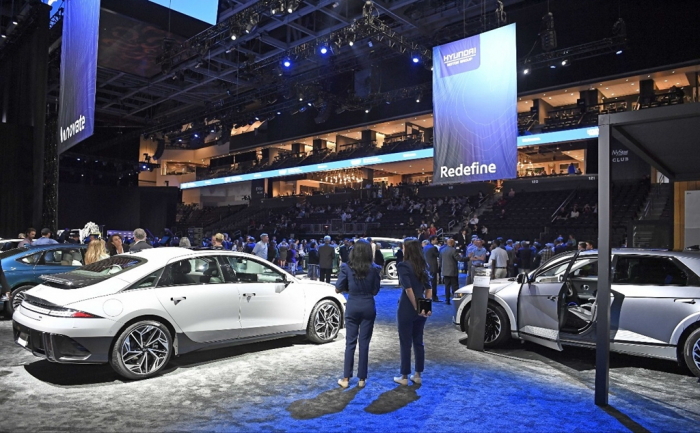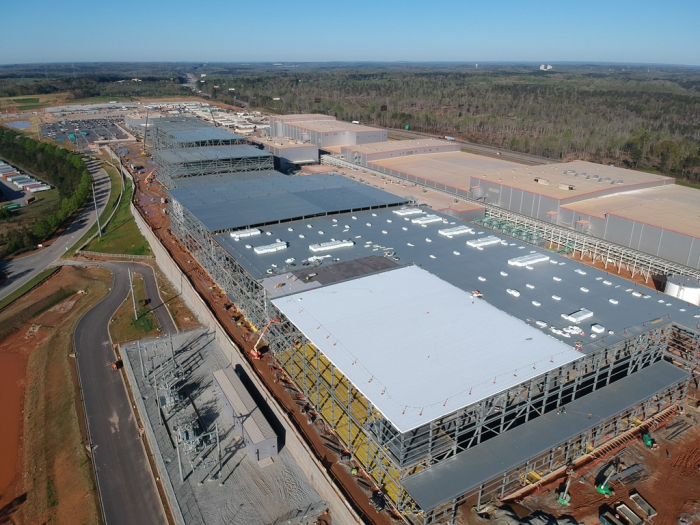Hyundai, SK to build $1.9 bn EV battery plant in US
The leading South Korean automaker is also known to be in talks with LG Energy for a joint battery plant in the US to benefit from the IRA
By Nov 25, 2022 (Gmt+09:00)
LG Chem to sell water filter business to Glenwood PE for $692 million


KT&G eyes overseas M&A after rejecting activist fund's offer


Kyobo Life poised to buy Japan’s SBI Group-owned savings bank


StockX in merger talks with Naver’s online reseller Kream


Meritz backs half of ex-manager’s $210 mn hedge fund



Hyundai Motor Group, South Korea’s top automaker, and SK On Co., the world’s fifth-largest electric vehicle battery manufacturer, will build a cell plant in the US with an estimated investment of 2.5 trillion won ($1.9 billion) to benefit from Washington’s measures to support batteries made in the country and its free trade partners.
Hyundai and SK On are scheduled to sign a memorandum of understanding on Nov. 28 for a battery plant in the US state of Georgia where the group is building its first dedicated EV facilities in the world’s third-largest market for such vehicles, according to industry sources on Friday.
The two are in talks for the 50-50 joint factory with an annual capacity of 20 gigawatt-hours enough for 300,000 EVs with an aim to start operations from the first quarter of 2026. The plant was estimated to cost some 2.5 trillion won ($1.9 billion), given the capacity.
SK On plans to produce pouch-type high nickel batteries not only for Hyundai’s new car-making facilities in Bryan County, on the Georgia coast just southwest of Savannah, but also for the automaker’s existing plant in Montgomery, Alabama and a factory of its affiliate Kia Corp. in West Point, Georgia.
The group and SK On have been in negotiations for the joint plant since May, aiming to conclude the talks in the third quarter. But the discussions were stalled as the two reportedly disagreed over the size of stake to be held by each. The battery maker has also been struggling to raise money through issuing new shares to private equity firms at home and abroad.
They speeded the negotiations since the US government introduced the Inflation Reduction Act (IRA) on Aug. 17 to boost the country’s EV industry.
The law provided a lifeline to SK On as the company will receive tax benefits of $35 per kilowatt-hour, which are expected to allow it to save money for long-term investments.
NOT ONLY FOR NEW PLANT BUT ALSO EXISTING FACTORIES
Hyundai and SK On are likely to build the battery plant around Savannah for convenient supply to those automaking facilities. The battery maker was already operating two plants in Georgia and secured land for two more factories there.

The group has been using SK On’s pouch-style batteries for most of its EVs. Hyundai Motor Co. installs the cells on its IONIQ 5 crossover, the first model of its dedicated battery electric vehicle lineup, and the recently launched IONIQ 6 sedan. The company will use the batteries for the IONIQ 7 sport utility vehicle to be released next year, and the Electrified GV70 to be produced in Hyundai’s Alabama plant.
The Kia EV 6 is equipped with the batteries, while the EV 9 SUV, which will be unveiled in April next year, is poised to use them.
The IRA requires EV makers to use batteries with a certain percentage of key materials from the country or its free trade partners.
From next year, EV makers must use batteries with materials sourced primarily in North America for their cars to be eligible for the tax credit of up to $7,500 per unit.
Qualifying EVs must contain at least 40% of their battery minerals and 50% of their battery components from those countries. The proportion will rise to 80% for minerals by 2027 and 100% for parts by 2029.
GROWTH POTENTIAL
The US, the world’s second-largest automobile market, has strong growth potential for EVs, industry sources said.
About 15 million new cars are sold a year, but EVs account for only about 7%, far lower than 20% in China, the world’s top market of cars including EVs, and 15% in Europe, the global No. 2 EV market.
US demand for EVs is expected to explode as the Biden administration took aggressive measures to develop the industry.
Hyundai was known to have been also in talks with South Korean LG Energy Solution Ltd., the world’s No. 2 battery maker, for a joint plant in the country to meet surging demand, industry sources said. The planned cell factory with SK On will be enough only for Hyundai’s new EV plant with an annual capacity of 300,000 units.
The group needs additional battery supply sources since Hyundai and Kia are reshuffling their US facilities to produce EVs and benefit from the US government’s tax credit on the eco-friendly vehicles manufactured in North America.
Hyundai and Kia do not have any technical problems in terms of cooperation with LG Energy since EV versions of the Kona SUV and the Niro crossover SUV are equipped with the company’s batteries.
Global EV makers have been trying to cooperate with multiple battery vendors to secure stable supplies.
Write to Hyung-Kyu Kim, Han-Shin Park and Il-Gue Kim at khk@hankyung.com
Jongwoo Cheon edited this article.
-

-
 Electric vehiclesHyundai Motor to boost US presence with $5.5 bn new Georgia EV plant
Electric vehiclesHyundai Motor to boost US presence with $5.5 bn new Georgia EV plantOct 26, 2022 (Gmt+09:00)
3 Min read -

-
 Electric vehiclesHyundai IONIQ 6 logs record pre-orders in South Korea
Electric vehiclesHyundai IONIQ 6 logs record pre-orders in South KoreaAug 23, 2022 (Gmt+09:00)
1 Min read -
 Electric vehiclesGeorgia state to provide $1.6 bn in incentives to Hyundai
Electric vehiclesGeorgia state to provide $1.6 bn in incentives to HyundaiMay 23, 2022 (Gmt+09:00)
3 Min read -
 Electric vehiclesHyundai to invest $10.5 bn in US EV, future mobility sectors
Electric vehiclesHyundai to invest $10.5 bn in US EV, future mobility sectorsMay 22, 2022 (Gmt+09:00)
5 Min read -
 BatteriesSK On to build $2.3 bn EV battery plant for Hyundai in US
BatteriesSK On to build $2.3 bn EV battery plant for Hyundai in USMay 12, 2022 (Gmt+09:00)
2 Min read -
 Electric vehiclesHyundai, Kia stun LA auto show with SEVEN, EV9 concept cars
Electric vehiclesHyundai, Kia stun LA auto show with SEVEN, EV9 concept carsNov 18, 2021 (Gmt+09:00)
2 Min read -
 Electric vehiclesHyundai Motor to debut IONIQ 7 concept in November LA auto show
Electric vehiclesHyundai Motor to debut IONIQ 7 concept in November LA auto showNov 04, 2021 (Gmt+09:00)
1 Min read -
 EV BatteriesSK Innovation to supply batteries to Hyundai IONIQ 7
EV BatteriesSK Innovation to supply batteries to Hyundai IONIQ 7Sep 22, 2021 (Gmt+09:00)
2 Min read


